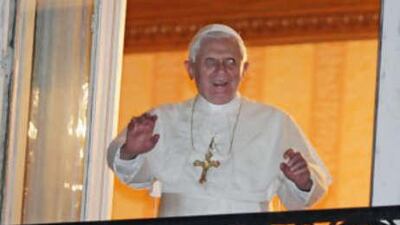Pope Benedict XVI is expected to lead an 200,000 followers in an open-air mass in Paris today to celebrate his first official visit to France, the "eldest daughter" of the Catholic Church. Following the ceremony at the historic Invalides complex south of the River Seine, the 81-year-old pontiff will leave on a pilgrimage to the Marian shrine of Lourdes, where another 200,000 people are set to flock for his visit.
The leader of the world's one billion Roman Catholics arrived yesterday on a four-day trip which comes as France faces a free-fall in the number of churchgoers despite its deep Christian heritage. He received a triumphant welcome on the first day of his trip, with 40,000 people turning out to hear him lead evening prayers at the emblematic Notre Dame cathedral in Paris. Yesterday the pope threw his weight behind a call by the French president, Nicolas Sarkozy, to rethink the strict separation of religion and state.
Mr Sarkozy, a twice-divorced lapsed Catholic, broke a French taboo during a trip to the Vatican last year by calling for a "positive secularism" that would allow space for religion in public life. In reply, Pope Benedict agreed that it was "fundamental" to "insist on the distinction between the political realm and that of religion" but also to recognise religion's role in building an "ethical" society.
While Catholicism remains by far France's number one religion, the country is also home to Europe's biggest Muslim and Jewish communities and staunchly upholds a 1905 law enshrining the separation of Church and State. Following a reception hosted by Mr Sarkozy and his wife Carla Bruni, the pope met with French Jewish leaders, telling them that "to be anti-Semitic was also to be anti-Christian", before holding brief talks with leaders of France's five-million strong Muslim community.
France's former chief rabbi, Joseph Sitruk, spoke afterwards of "a historic rapprochement between Judaism and the Church." In a keynote speech later before some 700 politicians, artists and religious leaders, at a majestic Cistercian college in central Paris, the pope warned that humanity faced "disaster" if it turned away from religion. "What gave Europe's culture its foundation, the search for God and the readiness to listen to Him, remains today the basis of any genuine culture," Pope Benedict said.
This is Pope Benedict's first trip to France since his election in 2005 following the death of John Paul II and his 10th trip abroad after Australia in July. Known as the Church's "eldest daughter" since Frankish King Clovis converted in the fifth century, France is home to 35 million baptised Catholics, although polls show few feel a strong sense of belonging to the Church. Fifty-one per cent say they consider themselves Catholic, down from 80 per cent in the early 1990s, and only 10 per cent attend mass regularly.
Late yesterday, tens of thousands of people took part in a candlelight procession from Notre Dame to the Invalides, many carrying sleeping bags and food to keep them going until the mass. After Saturday's mass, the pope flies to Lourdes for commemorations of the 150th anniversary of the Vatican-recognised apparitions of the Virgin Mary to a peasant girl. More than 200,000 people are expected to descend on the southwestern town where Bernadette Soubirous is said to have seen the Virgin Mary 18 times over a period of a few months in 1858.
